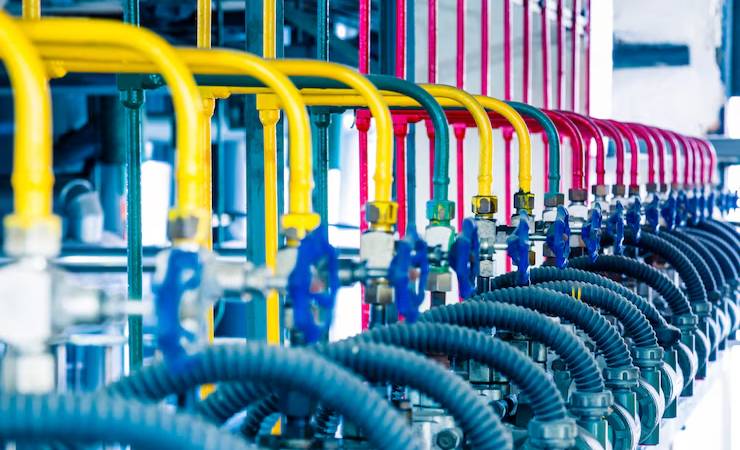Rubber hoses find extensive application in industries. They are favoured because they are flexible, cost-effective, and easy to use. A rubber hose can be used in factories, plants, and warehouses to manage daily activities without any problems.
A reputable rubber hose manufacturer offers hoses that are safe and durable in the industrial environment. They are made to be consistent in pressure, temperature, and material flow.
Conversely, PTFE hoses are applied in more complicated applications. These hoses are non-reactive, heat-resistant, and long-lasting. However, they are not as flexible or costly. PTFE hoses are more suitable for operations that deal with aggressive chemicals. However, rubber hoses remain high-performance in general-purpose industrial applications.
What Makes Rubber Hoses a Preferred Option
Rubber hoses are used in high-pressure situations and are strengthened by inner layers. These layers can be textile or steel wire braiding to provide extra strength. A flexible hose manufacturer produces such hoses to be used in harsh environments where bending, twisting, and movement are the order of the day. One of the reasons why industries use rubber hoses on a regular basis is flexibility.
A rubber hose is also simple to install. It does not require special fittings or support structures. This is time and effort-saving during assembly. Flexible rubber hoses are preferable in areas where the equipment is frequently relocated or space is restricted.
When Rubber Outperforms PTFE
PTFE hoses are superior in chemical resistance and temperature tolerance. But not every industry needs that. Rubber hoses are good enough for many operations. A rubber hose manufacturer will offer hoses that are abrasion-resistant, oil-resistant, and long-lasting. These hoses are ideal for agriculture, manufacturing, transportation, and construction sectors.
PTFE hoses are rigid. That’s a problem when flexibility is a requirement. In many cases, the cost and stiffness of PTFE hoses make them less practical. Rubber hoses remain a better choice when the environment is stable and the media being transferred is not highly reactive.
Important Factors to Compare
- Cost: Rubber hoses cost less than PTFE. Both in purchase and installation.
- Flexibility: A flexible hose manufacturer can deliver rubber hoses that bend, stretch, and fit tight areas.
- Installation: Rubber hoses are quicker to install. No special tools or fittings required.
- Maintenance: With proper use, rubber hoses require less frequent maintenance.
- Availability: Rubber hoses are easy to source in different lengths, diameters, and pressure ratings.
Choosing Based on Application
Every application is different. If an industry handles sensitive chemicals or needs extreme temperature resistance, PTFE hoses are the correct option. But most industries don’t need that level of resistance. For general fluid transfer, air lines, cooling systems, and light chemical use, rubber hoses are efficient and safe.
Working with a reliable rubber hose manufacturer or flexible hose manufacturer ensures that the hoses meet the exact industrial requirements. These manufacturers offer tested and certified products built to handle real-world challenges.
Conclusion
PTFE hoses are the right fit for high-risk, specialised environments. But for day-to-day industrial use, rubber hoses offer better value and usability. They are flexible, cost-effective, and easy to handle. A reliable rubber hose manufacturer will help industries choose the right hose for their system. For operations where movement, flexibility, and lower costs are priorities, rubber hoses are a smarter choice. Connect with a trusted flexible hose manufacturer to explore industrial-grade rubber hose options built for performance.
Featured Image Source: https://img.freepik.com/free-photo/steel-pipelines-cables-plant_1359-133.jpg
